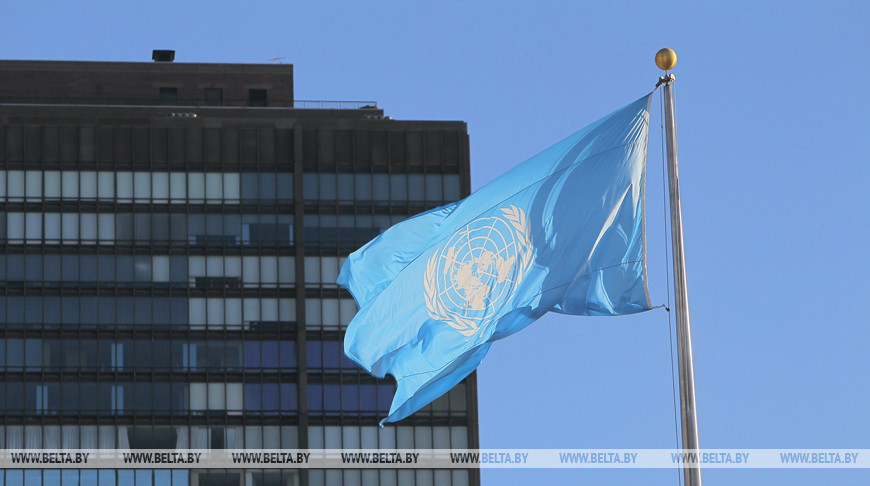
MINSK, 20 August (BelTA) - Belarus intends to raise the issue of access to the sea that has been blocked for Belarus. This follows from the answer of the press secretary of the Belarusian Ministry of Foreign Affairs Anatoly Glaz to a question from BelTA about whether Belarus is planning to participate in the upcoming third UN Conference for Landlocked Developing Countries in December in Botswana.
UN Secretary General António Guterres has sent an invitation to Belarusian President Aleksandr Lukashenko to participate in the Third UN Conference on Landlocked Developing Countries.
“Belarus fully feels the consequences of the illegal actions by a number of countries, which limit our country’s right of access to and from the sea envisaged in the UN Convention. We plan to push this issue very hard and insist that a number of countries must fulfill their international obligations within the current legal framework,” Anatoly Glaz said.
He said that the time has come to clearly identify the problems that Belarus is facing in exercising its legitimate rights at a high level.
"We may not have paid enough attention to this topic before, but the situation is outrageous," he stressed. "For example, the Baltic countries deliberately restrict the access of our state to the sea, to trade, economic and humanitarian contacts with the outside world. From a legal point of view, these countries are openly abusing their geographical location."
Anatoly Glaz recalled that Lithuania, Latvia and Estonia have banned the export of Belarusian potash fertilizers. Although there are opportunities and ports where Belarus owns terminals. "For example, Belkali owns 30% of the terminal in the port of Klaipeda. As a result, rising prices and limited supply of fertilizers on international markets have affected third countries which are already experiencing problems with food supplies," he said.
In addition, the transit of goods through the territories of the Baltic countries and Poland is generally decreasing. They are suffering colossal losses from the lack of necessary goods. "For example, the annual direct losses of the Lithuanian economy from the severance of ties with Belarus are estimated at about $1 billion. Latvian ports are also in critical condition. But opportunities to avoid such a situation are still there!" Anatoly Glaz noted.
He also spoke about the problems created for citizens who also use the maritime infrastructure, and not only: "Our neighbors are closing checkpoints, introducing more and more restrictions. Suffice it to recall that since June 2024, Lithuanian customs officers have been confiscating food, medicines and other goods for personal use from citizens of Belarus, Lithuania and third countries, including children, when entering Lithuania or transiting through Lithuanian territory. Only 0.5 liters of drinking water are allowed and only in an open container!"
"The situation on the border is outrageous. At the initiative of these countries, almost all border crossings on the border with Belarus have been closed, which forces people to stand in long queues. Cargo transportation has been practically brought to a standstill. Hundreds of heavy-duty trucks, including those with humanitarian cargo, are unable to reach their destination points on time. Regular bus services are being cut,” the official representative of the Belarusian Ministry of Foreign Affairs said.
For example, there were 45 regular bus services between Belarus and Lithuania in 2023. They carried a total of 450,000 people were transported that year. In August 2024, 40 regular bus services were left, with Lithuania planning to cut them further to 29 by the end of the year. By the end of 2024 bus services will be slashed by 35%, with tourist numbers reducing by 150,000 people.
“All these political intrigues contradict the UN Charter, directly violate the UN Convention on the Law of the Sea, the International Covenant on Civil and Political Rights, the International Convention on the Elimination of All Forms of Racial Discrimination and other human rights documents. Our neighbors resort to extraterritorial violation of the rights of Belarusian citizens, including limiting their right to movement,” Anatoly Glaz said. “Behind their actions are political goals, economic diktat, bargaining for preferences, which is unacceptable!”.
He added that at the upcoming UN conference it is necessary for all to evaluate and see what tools can be used in this context. “Many participants of this upcoming event will be able to see with concrete examples what lawlessness is being committed by the authorities of the countries I mentioned. It is worth thinking twice whether it is necessary to deal with such dishonest and opportunistic partners. Of course, while attending the conference, we will also use the opportunity to exchange experience and hold a number of bilateral meetings, primarily with representatives of the Global South,” the press secretary summarized.
The First UN Conference on Landlocked Developing Countries was held in Almaty in August 2003. The Vienna Program of Action for Landlocked Developing Countries for the Decade 2014–2024 was adopted at the second United Nations Conference on Landlocked Developing Countries, held in Vienna in November 2014. The third international conference is scheduled to take place in Gaborone, Botswana, on 10-13 December 2024. The purpose of the upcoming conference is to assess the implementation of the Vienna Program of Action and to develop and adopt a new strategic document for the relevant category of countries.
The 1982 UN Convention on the Law of the Sea establishes certain rights for landlocked states, that is, states that do not have a sea coast. Such countries have the right of access to and from the sea in order to exercise the rights provided for in the Convention, including rights relating to the freedom of the high seas and the common heritage of mankind. To this end, they enjoy freedom of transit through the territories of transit states by all means of transport. Transit traffic shall not be subject to any customs duties and taxes or other charges, except those levied for specific services rendered in connection with such traffic.
Transit states should take all appropriate measures to avoid delays or other difficulties of a technical nature in transit traffic. Ships flying the flag of landlocked states shall enjoy the same treatment in seaports as that accorded to other foreign ships.













